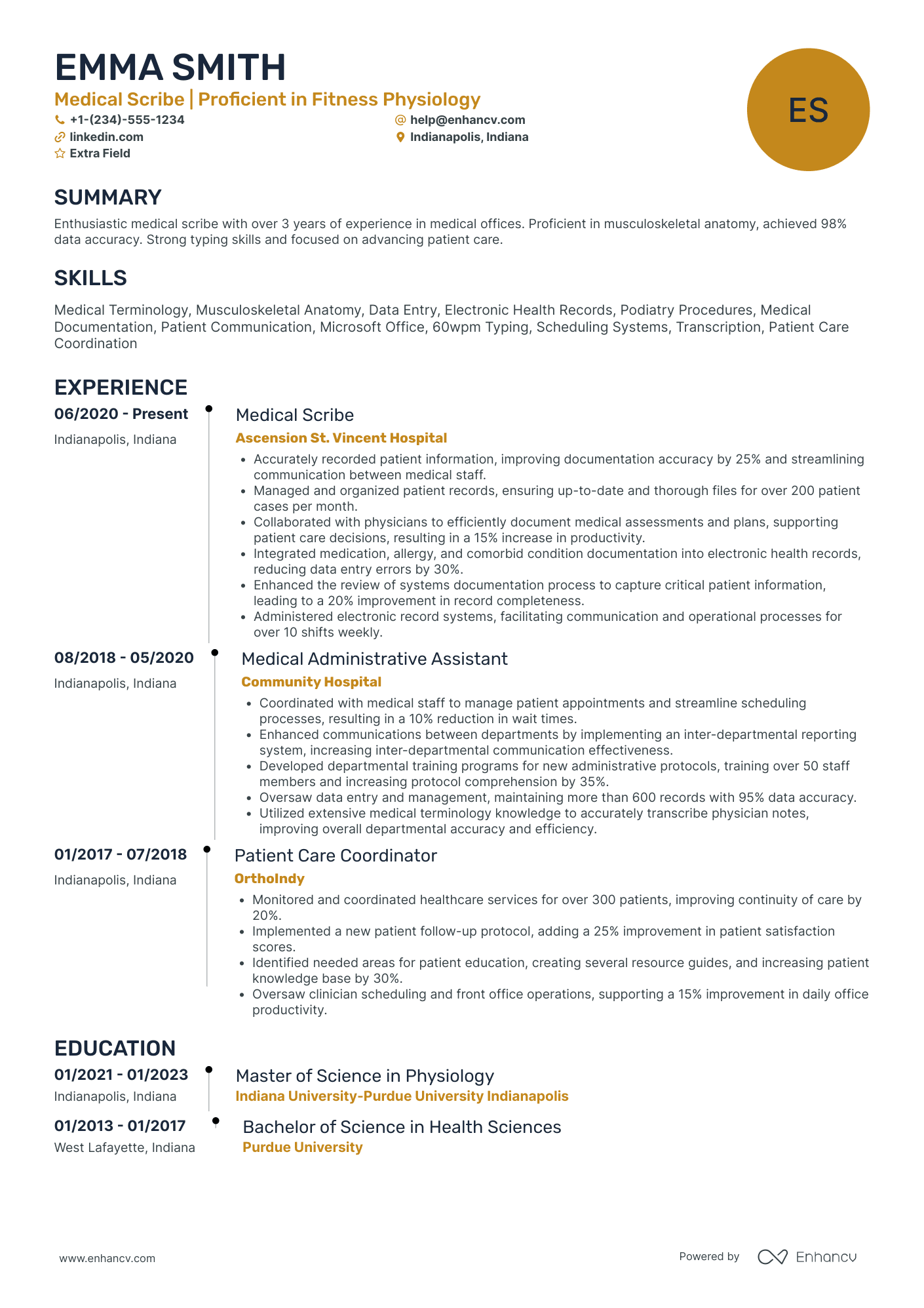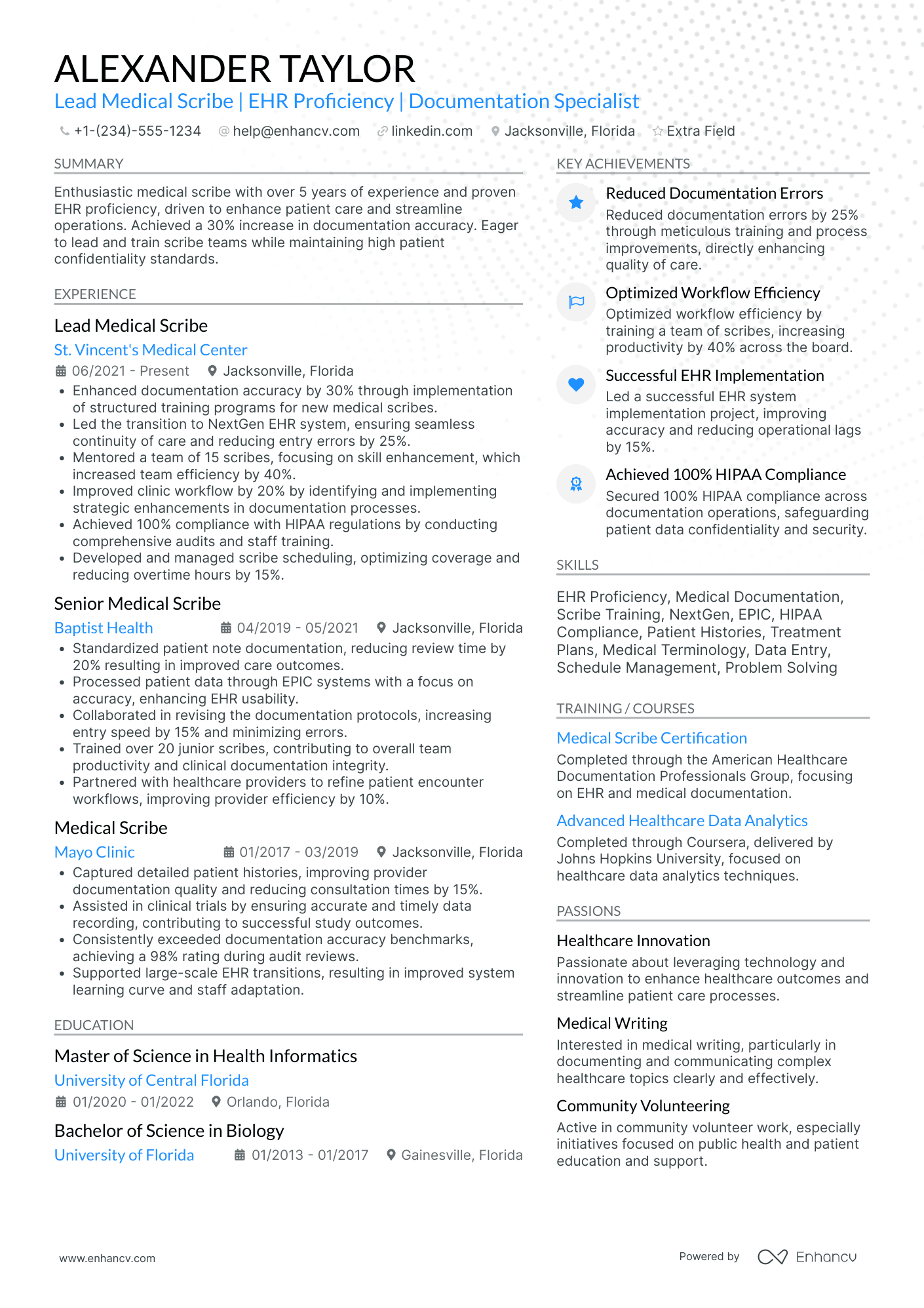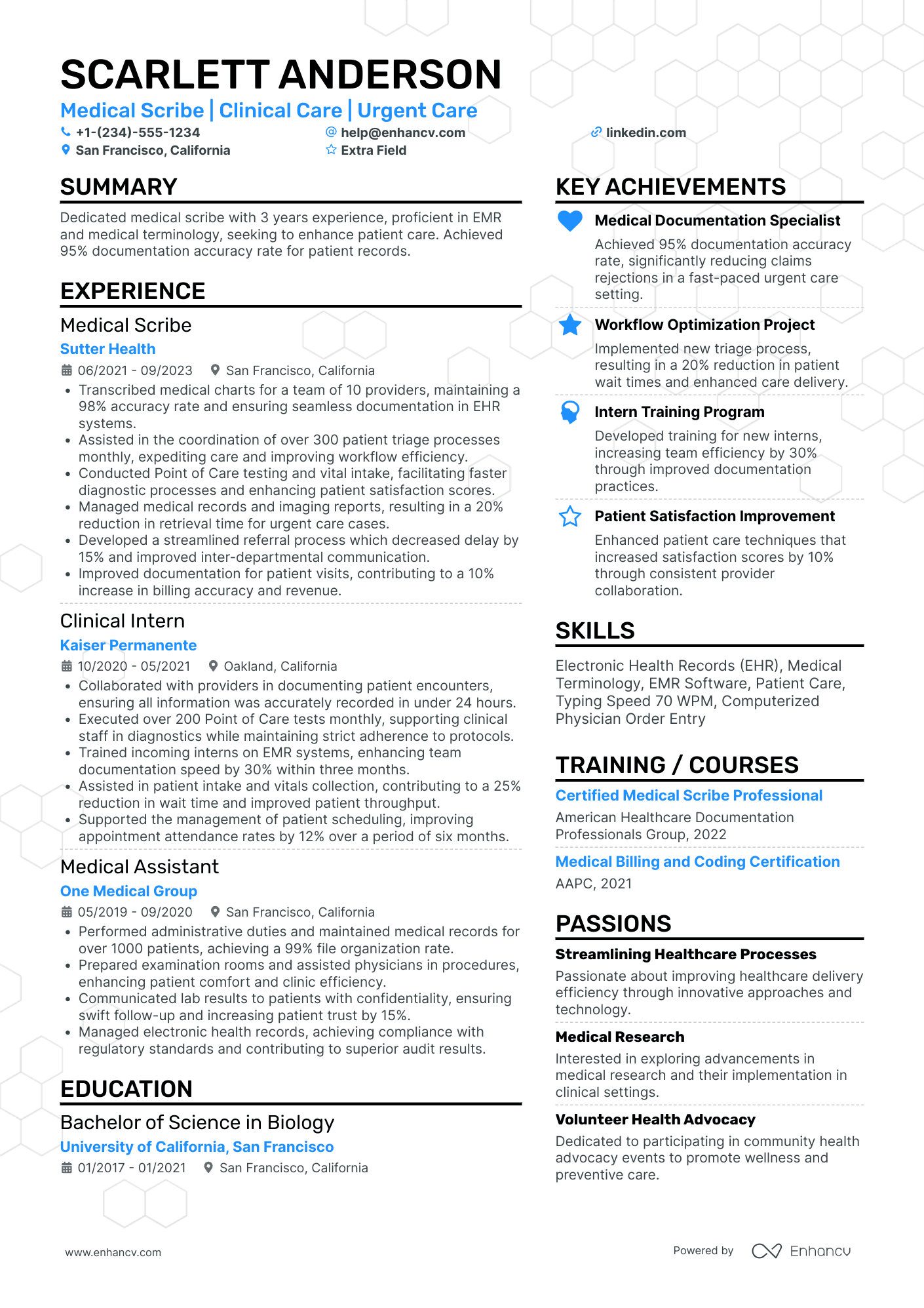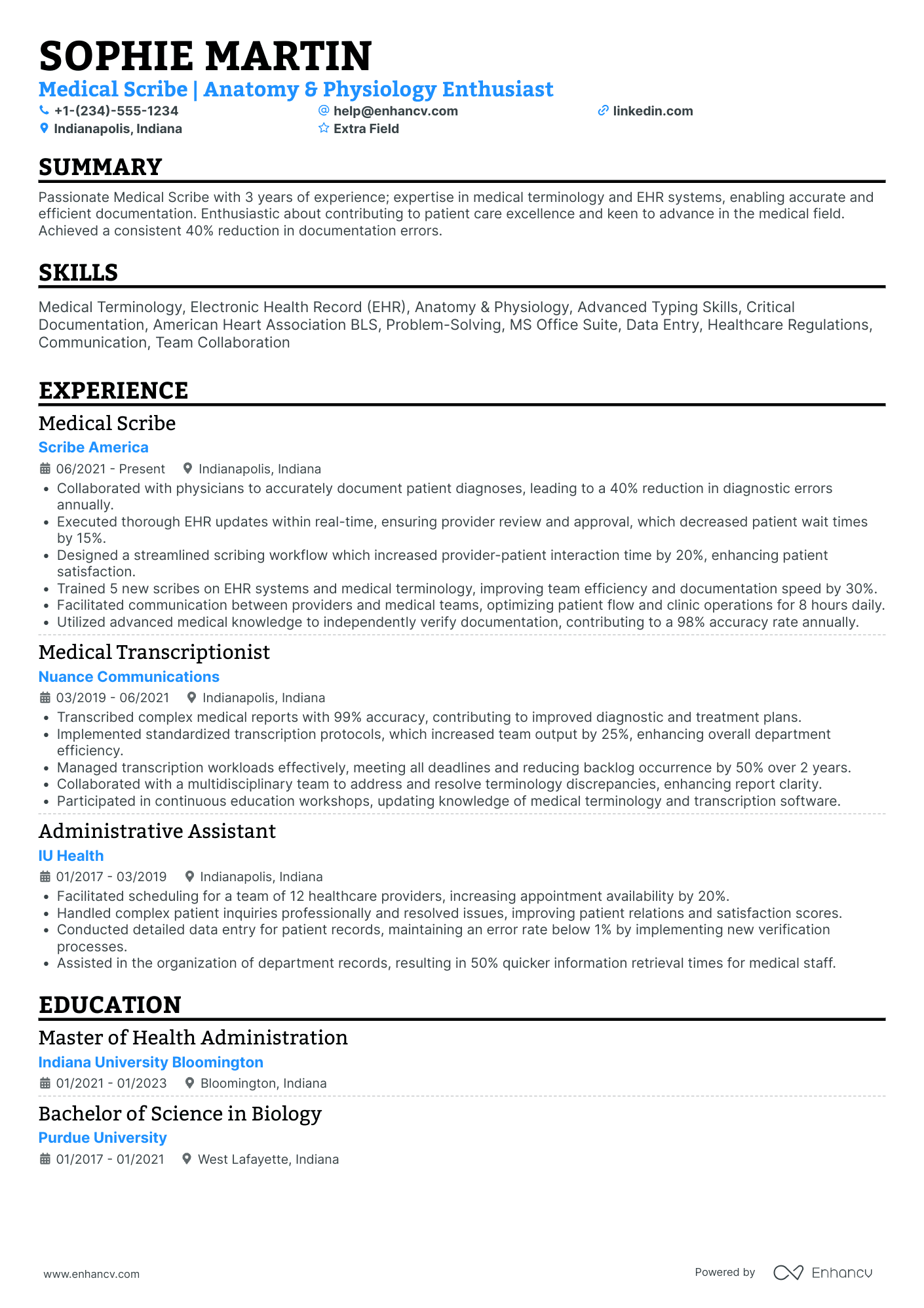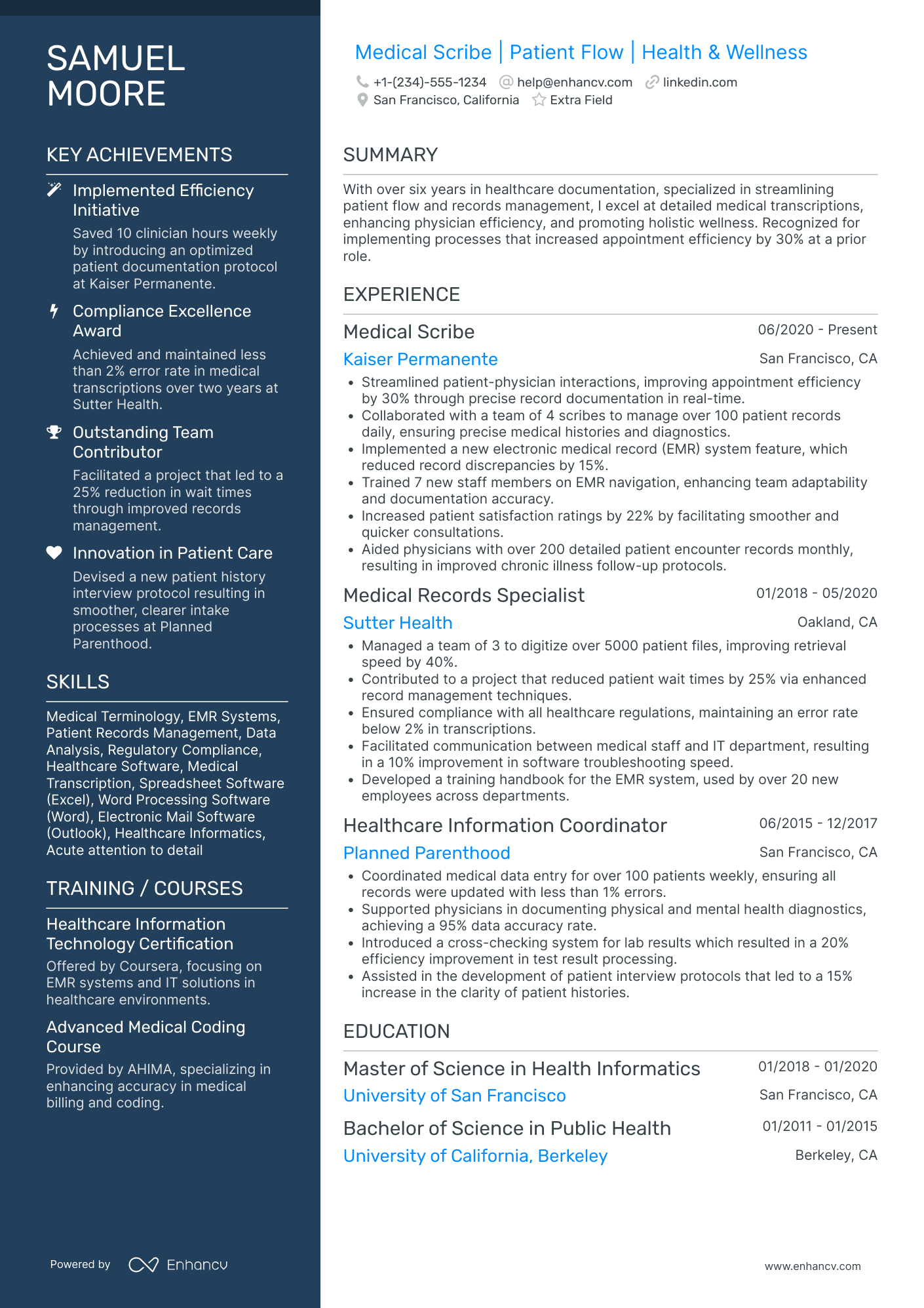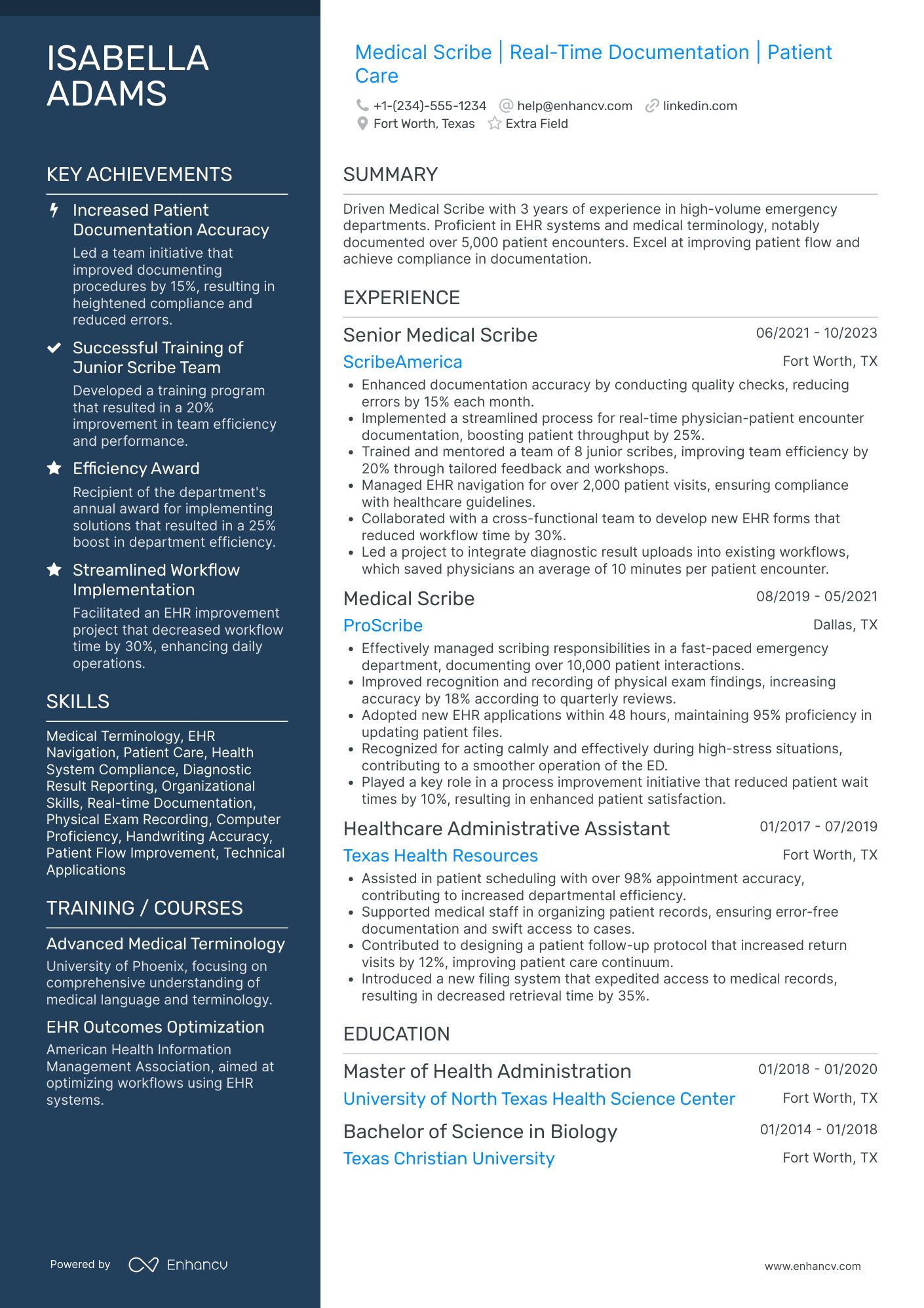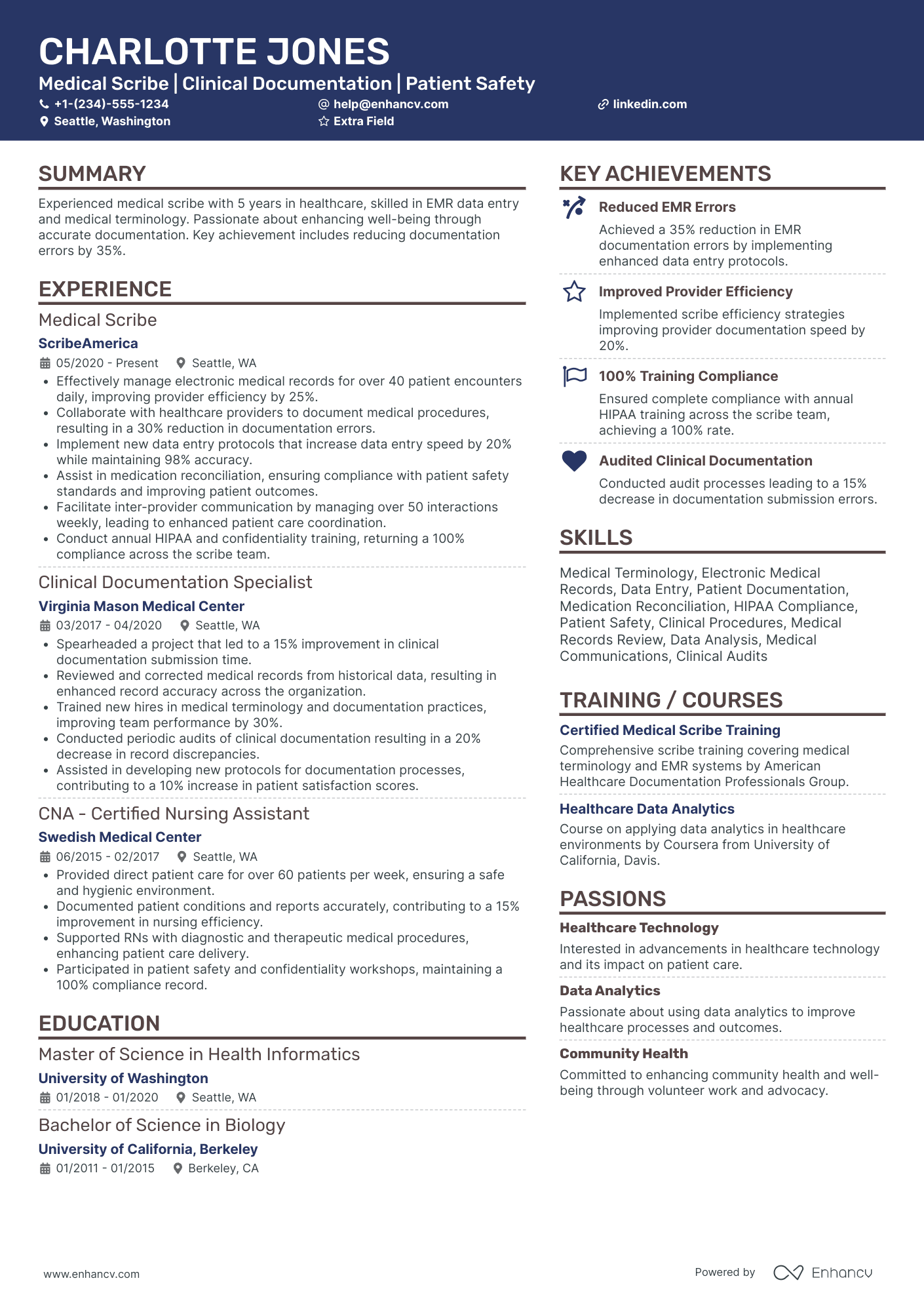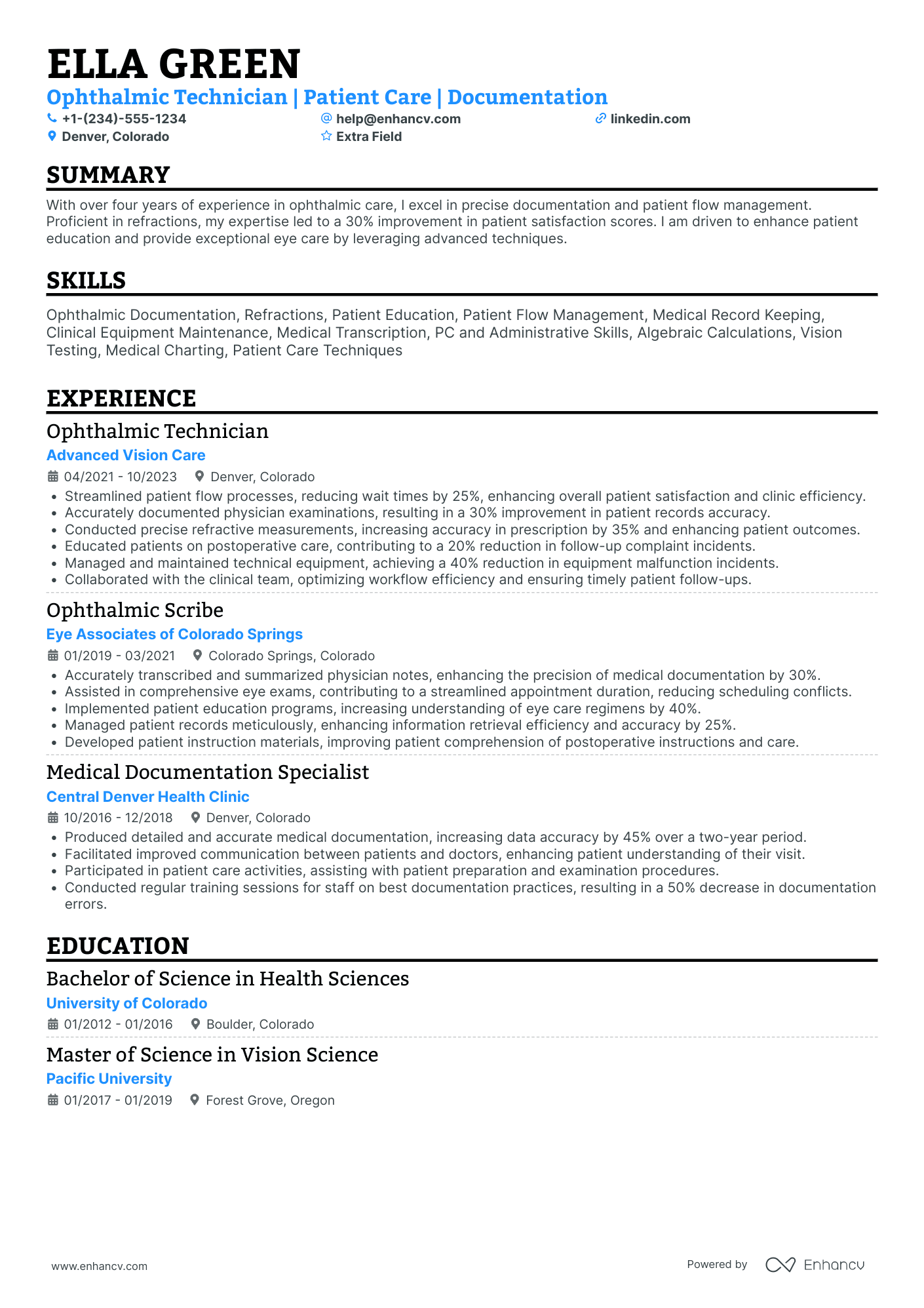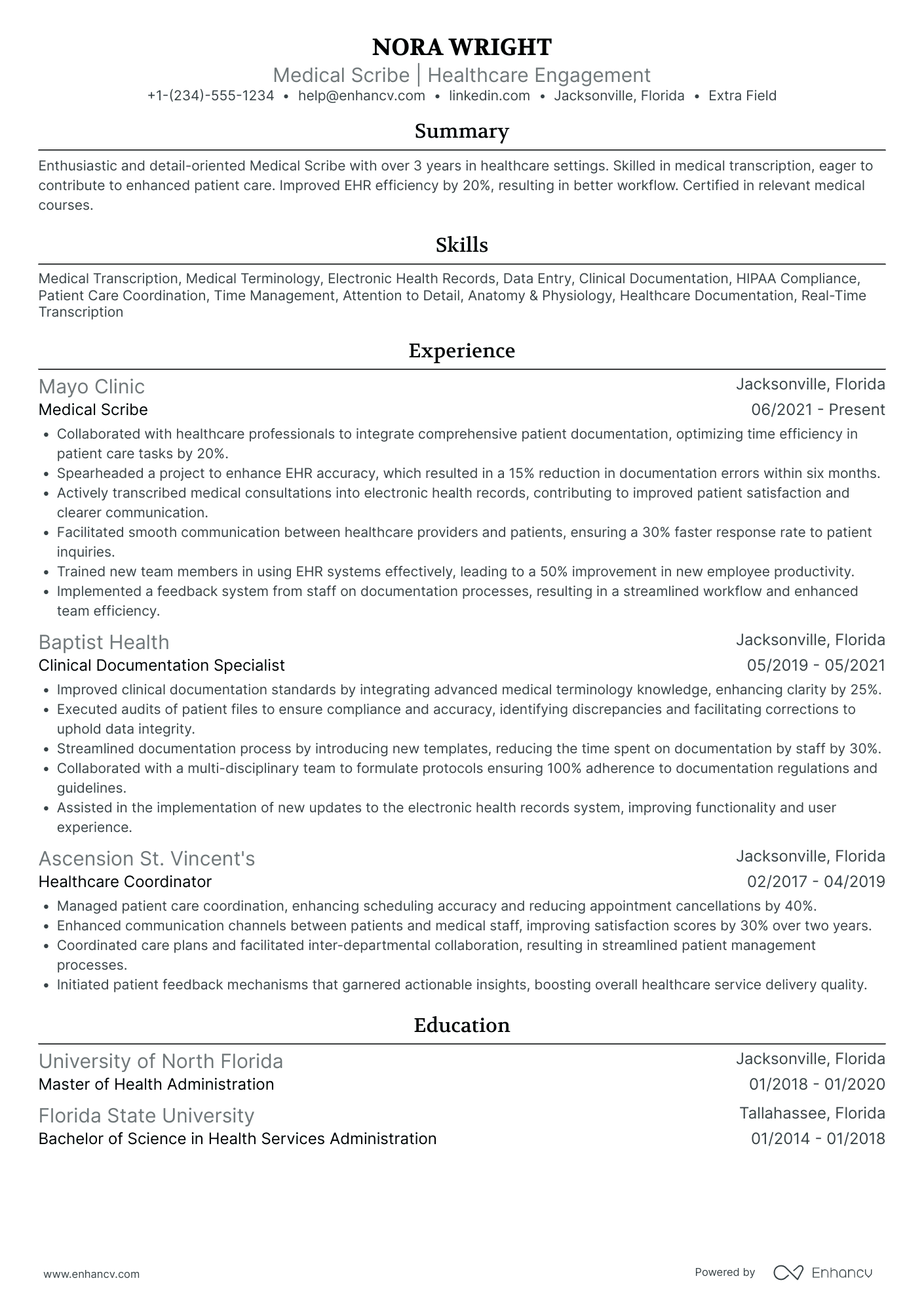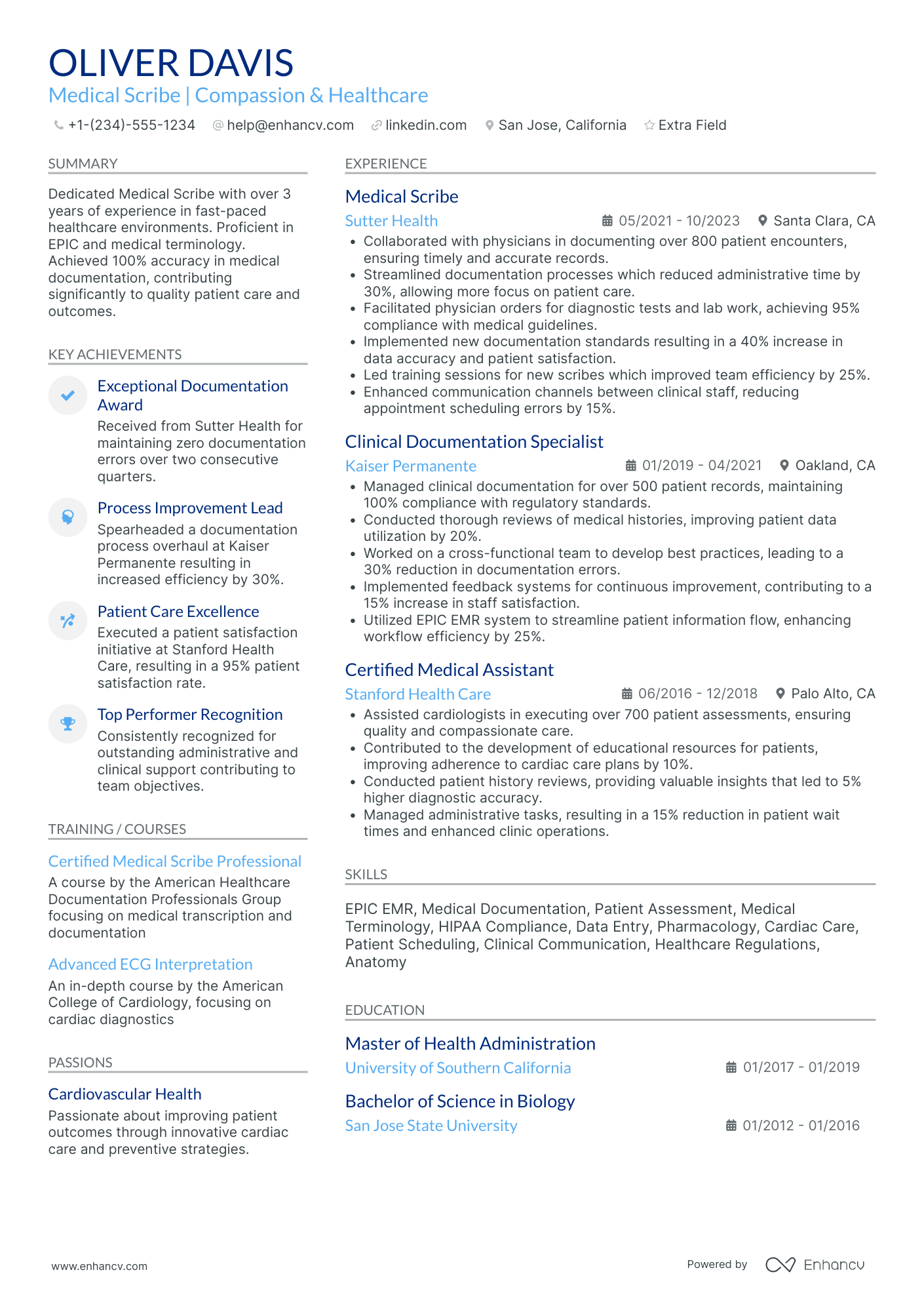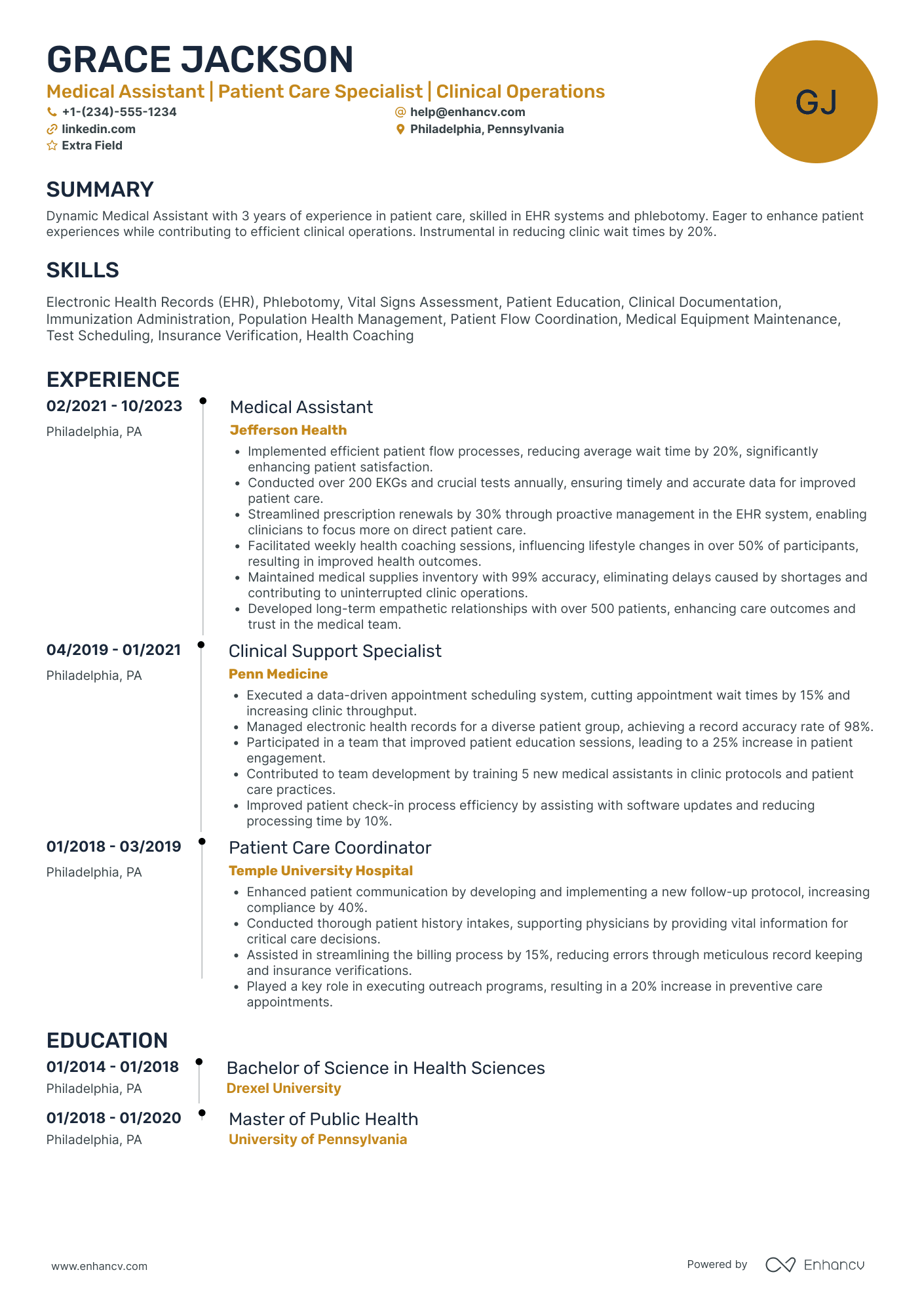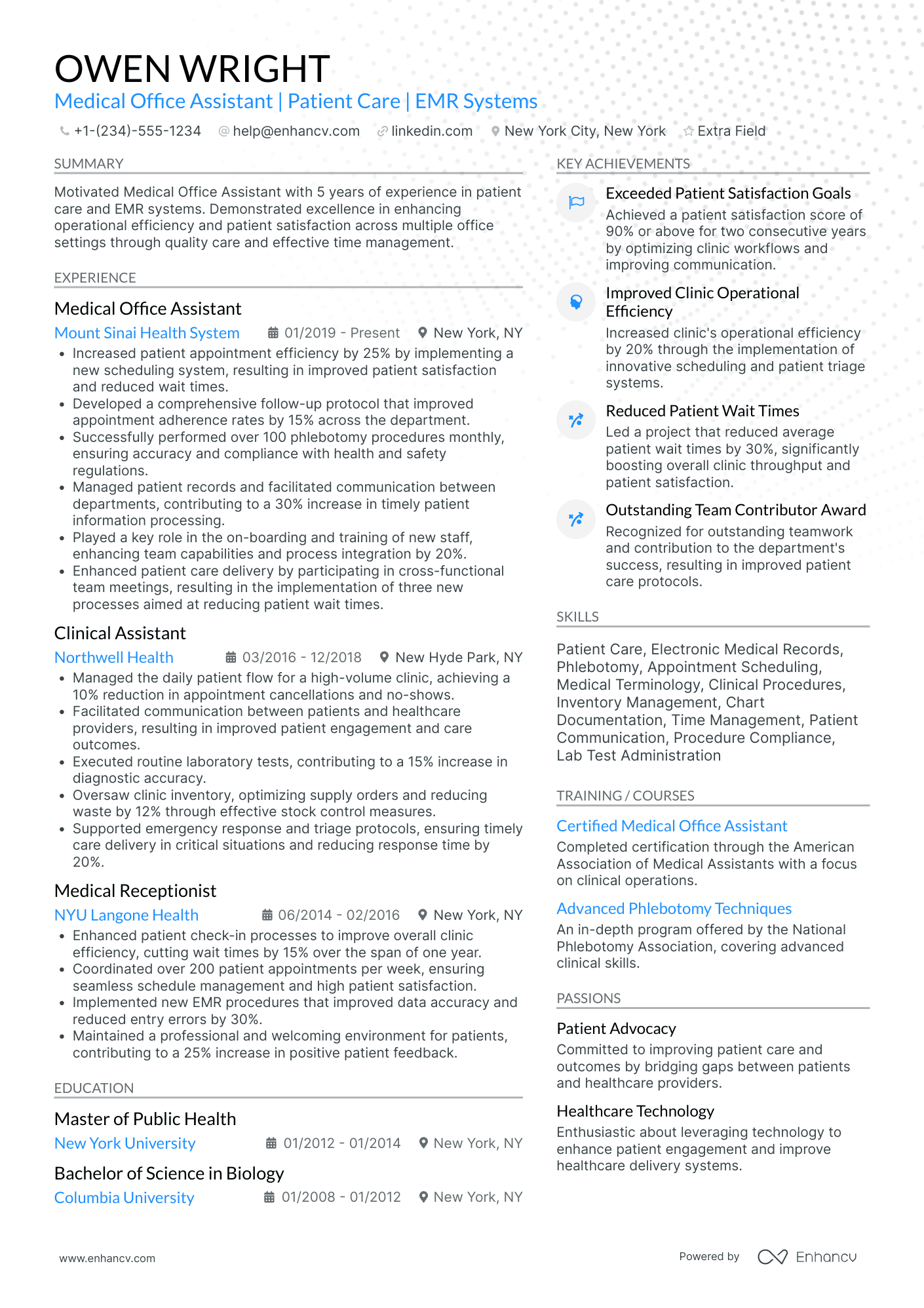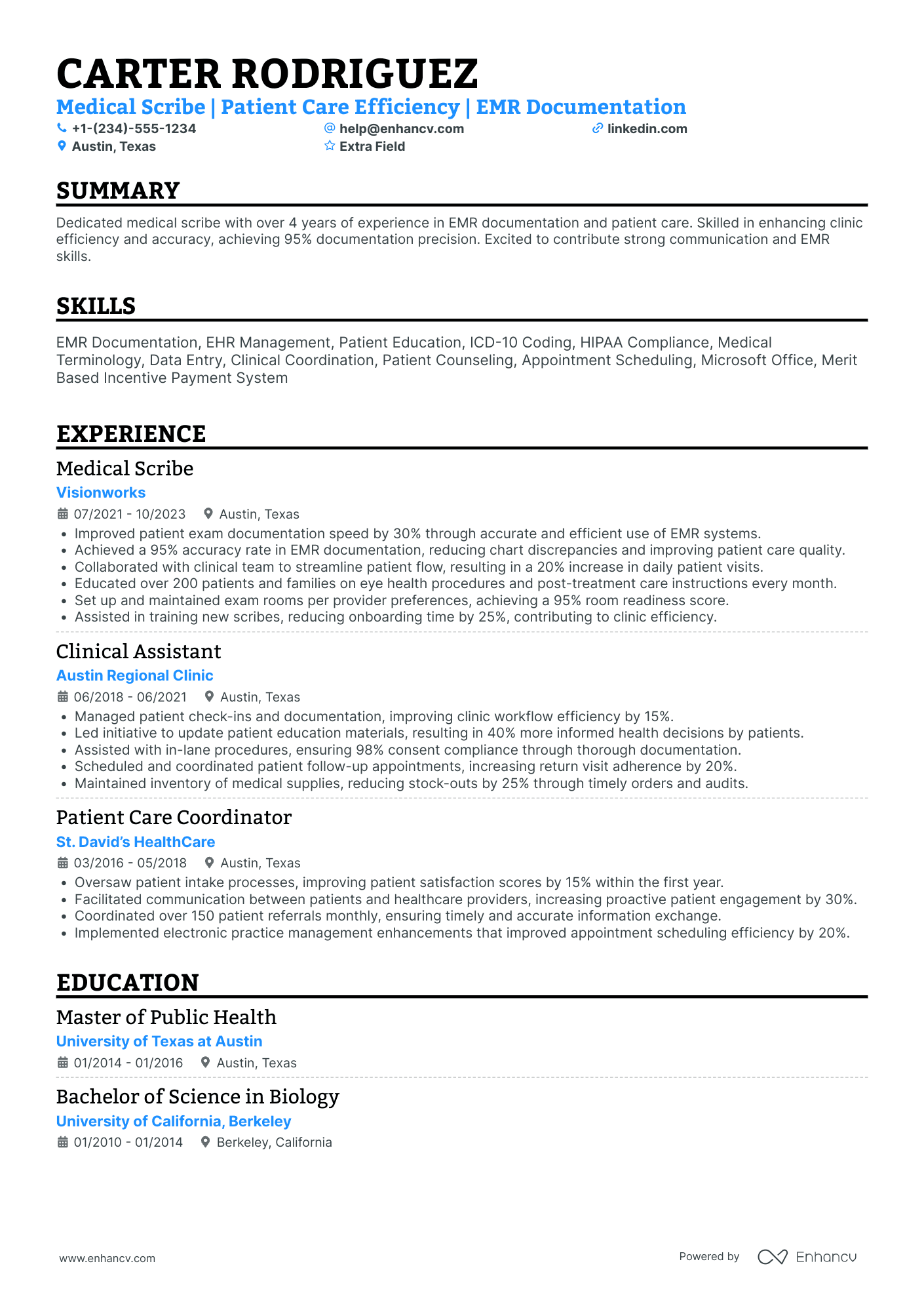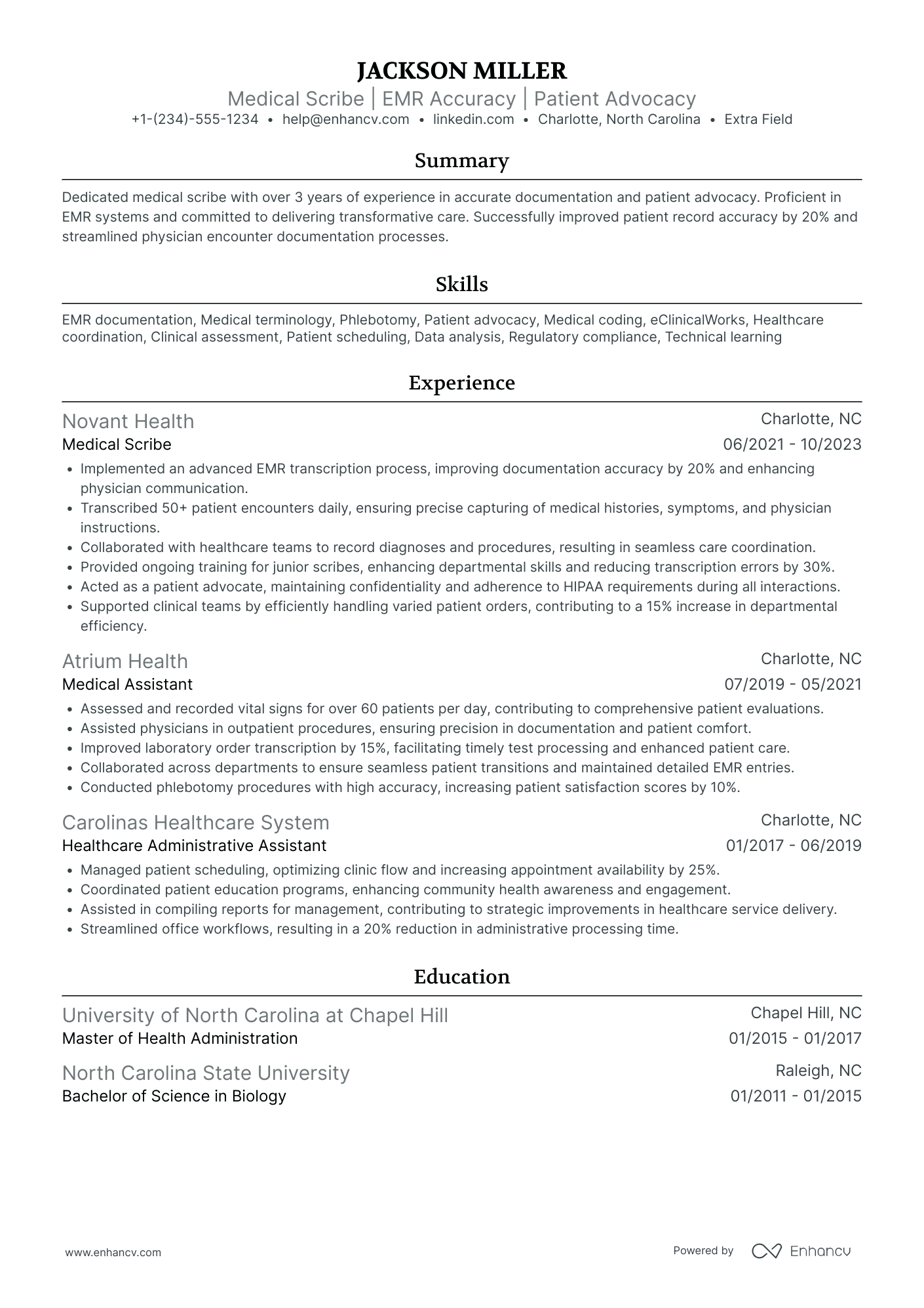Most medical scribe resume drafts fail because they read like task logs and bury clinical accuracy, speed, and documentation quality. That hurts when an applicant tracking system filters keywords and recruiters scan fast in a crowded applicant pool.
A strong resume shows outcomes you delivered, not just tools you used. You should highlight charts completed per shift, turnaround time, error-rate reductions, specialty coverage, provider throughput gains, and cleaner notes that cut addendum requests.
Key takeaways
- Quantify documentation speed, accuracy, and patient volume instead of listing generic scribe duties.
- Match EHR platforms, specialties, and terminology from the job posting in every tailored resume.
- Use reverse-chronological format with experience; switch to hybrid if you lack paid scribe roles.
- Tie every listed skill to a specific outcome in your experience or project bullets.
- Place certifications above education when they're more recent or more relevant than your degree.
- Write a three- to four-line summary featuring your specialty, core tools, and one measurable result.
- Build and refine your medical scribe resume faster with Enhancv to stay competitive in a crowded market.
Job market snapshot for medical scribes
We analyzed 252 recent medical scribe job ads across major US job boards. These numbers help you understand skills in demand, employment type trends, top companies hiring at a glance.
What level of experience employers are looking for medical scribes
| Years of Experience | Percentage found in job ads |
|---|---|
| 1–2 years | 44.4% (112) |
| 10+ years | 13.5% (34) |
| Not specified | 41.3% (104) |
Medical scribe ads by area of specialization (industry)
| Industry (Area) | Percentage found in job ads |
|---|---|
| Healthcare | 88.9% (224) |
| Finance & Banking | 6.7% (17) |
| Education | 4.0% (10) |
Top companies hiring medical scribes
| Company | Percentage found in job ads |
|---|---|
| CVS Health | 43.3% (109) |
| Summit Health, Inc. | 14.3% (36) |
| ScribeAmerica | 13.5% (34) |
Role overview stats
These tables show the most common responsibilities and employment types for medical scribe roles. Use them to align your resume with what employers expect and to understand how the role is structured across the market.
Day-to-day activities and top responsibilities for a medical scribe
| Responsibility | Percentage found in job ads |
|---|---|
| Medical terminology | 51.2% (129) |
| Typing | 42.9% (108) |
| Hipaa | 38.1% (96) |
| Clinical documentation | 35.7% (90) |
| Icd-10 | 33.7% (85) |
| Cpt | 32.5% (82) |
| Population health tools | 21.0% (53) |
| Computer literacy | 17.5% (44) |
| Emr | 16.3% (41) |
| Computer proficiency | 15.1% (38) |
| Basic life support | 13.9% (35) |
| Phlebotomy | 9.9% (25) |
How to format a medical scribe resume
Recruiters reviewing medical scribe resumes prioritize clinical documentation accuracy, familiarity with electronic health record (EHR) systems, and the ability to work efficiently alongside physicians in fast-paced settings. A clean, well-structured resume format ensures these signals surface quickly during both human review and applicant tracking system (ATS) screening.
I have significant experience as a medical scribe—which format should I use?
Use a reverse-chronological format to highlight your progression through clinical settings and the depth of your documentation expertise. Do:
- Lead with your most recent scribe position, emphasizing the specialty, patient volume, and scope of your responsibilities.
- Feature EHR platforms you've used (Epic, Cerner, Athenahealth) alongside medical terminology proficiency and relevant certifications.
- Quantify your impact with metrics tied to documentation accuracy, physician efficiency, or turnaround times.
I'm junior or switching into a medical scribe role—what format works best?
A hybrid format works best, letting you lead with relevant clinical skills and coursework while still showing your work history in chronological order. Do:
- Place a skills section near the top featuring medical terminology, EHR familiarity, typing speed, and any clinical exposure.
- Include academic projects, volunteer clinical hours, shadowing experiences, or healthcare internships that demonstrate patient-facing or documentation-related competencies.
- Connect every listed skill or experience to a specific action and a measurable or observable result.
Why not use a functional resume?
A functional format strips away the clinical context and timeline that hiring managers rely on to assess your readiness for real-time documentation in a medical environment.
- Career changers with transferable skills: If you're transitioning from medical transcription, health information management, or another documentation-heavy healthcare role, a functional format can bridge the gap by foregrounding relevant competencies.
- Limited formal scribe experience: If your clinical exposure comes primarily from academic training, volunteer work, or certification programs rather than paid positions, grouping skills by category can present a more cohesive picture.
- Resume gaps: If you've been away from clinical work but maintained relevant certifications or completed continuing education, a functional layout can redirect focus to current qualifications.
With your format established, the next step is filling it with the right sections to present your qualifications effectively.
What sections should go on a medical scribe resume
Recruiters expect a clean, complete resume that proves you can document patient encounters accurately, work fast, and support clinicians.
Use this structure for maximum clarity:
- Header
- Summary
- Experience
- Skills
- Projects
- Education
- Certifications
- Optional sections: Awards, Volunteering, Languages
Strong experience bullets should emphasize documentation accuracy, turnaround time, encounter volume, specialty scope, and measurable improvements to clinic workflow or chart quality.
Is your resume good enough?
Drop your resume here or choose a file. PDF & DOCX only. Max 2MB file size.
Now that you’ve organized the key parts of your medical scribe resume, focus on writing your experience section so each role supports those details with clear, job-relevant impact.
How to write your medical scribe resume experience
Your experience section is where you prove you've delivered real value in clinical documentation, patient workflow support, and health information management. Hiring managers prioritize demonstrated impact—accurate records maintained, systems improved, provider efficiency increased—over generic task lists that describe daily duties without measurable outcomes.
Each entry should include:
- Job title
- Company and location (or remote)
- Dates of employment (month and year)
Three to five concise bullet points showing what you owned, how you executed, and what outcomes you delivered:
- Ownership scope: the clinical documentation workflows, electronic health record (EHR) systems, patient charts, or provider teams you were directly accountable for as a medical scribe.
- Execution approach: the tools, platforms, and methods you used—such as EHR software, medical terminology standards, templating systems, or real-time charting techniques—to deliver accurate and timely documentation.
- Value improved: the specific gains you drove in documentation accuracy, chart turnaround time, provider productivity, coding compliance, or reduction in transcription errors tied to your medical scribe responsibilities.
- Collaboration context: how you partnered with physicians, nurses, billing specialists, or administrative staff to ensure seamless clinical documentation and continuity of patient care.
- Impact delivered: the tangible outcomes your work produced, expressed through results such as faster chart completion, fewer documentation discrepancies, improved provider throughput, or stronger audit performance—not just activities you performed.
Experience bullet formula
A medical scribe experience example
✅ Right example - modern, quantified, specific.
Medical Scribe
Riverside Orthopedics | Austin, TX
2023–Present
High-volume orthopedic clinic supporting eight providers across sports medicine, joint replacement, and spine care.
- Documented real-time histories, examinations, assessments, and plans in Epic, cutting provider after-hours charting time by 25% (about forty-five minutes per shift).
- Built specialty templates and SmartPhrases in Epic for injections, post-op checks, and imaging follow-ups, reducing note completion time by 30% while maintaining 98% same-day close rate.
- Reconciled medications, allergies, and problem lists using SureScripts and clinic protocols, decreasing chart discrepancies by 40% and supporting safer prescribing decisions.
- Coordinated with physicians, medical assistants, and front-desk staff to streamline prior authorization and imaging workflows, improving MRI order-to-schedule turnaround by 18%.
- Ensured documentation met billing and compliance standards by aligning notes to Evaluation and Management guidelines and ICD-10 specificity, increasing clean-claim rate from 93% to 97%.
Now that you've seen how a strong experience section comes together, let's focus on adjusting those details to match the specific job you're applying for.
How to tailor your medical scribe resume experience
Recruiters evaluate your medical scribe resume through applicant tracking systems and manual review. Tailoring your experience section to each job posting ensures your qualifications align with what the hiring team prioritizes.
Ways to tailor your medical scribe experience:
- Match the exact EHR platform named in the job description.
- Mirror clinical documentation standards or methodologies the posting specifies.
- Use the same medical terminology referenced in the listing.
- Highlight patient volume or throughput metrics the role emphasizes.
- Include relevant specialty experience when the position requires it.
- Emphasize HIPAA compliance and documentation accuracy if mentioned.
- Reference real-time charting workflows described in the job posting.
- Align your collaboration style with the provider support model outlined.
Tailoring means framing your real accomplishments to reflect the role's stated priorities—not forcing disconnected keywords into your experience.
Resume tailoring examples for medical scribe
| Job description excerpt | Untailored | Tailored |
|---|---|---|
| "Accurately document patient encounters in real time using Epic EMR during physician-patient visits in a fast-paced emergency department." | Assisted with documentation and helped doctors with their notes. | Documented an average of 30 patient encounters per shift in real time using Epic EMR, supporting emergency department physicians during high-acuity visits. |
| "Transcribe physician dictations, update patient histories, and ensure all ICD-10 codes are entered correctly before chart closure." | Handled medical records and updated patient information in the system. | Transcribed physician dictations and maintained accurate patient histories, verifying ICD-10 code entries across 50+ charts weekly with a 99% accuracy rate before closure. |
| "Coordinate with nursing staff and lab technicians to track pending orders, lab results, and referral statuses within Cerner." | Communicated with other team members and followed up on various tasks. | Tracked pending orders, lab results, and referral statuses in Cerner by coordinating directly with nursing staff and lab technicians, reducing result follow-up delays by 20%. |
Once your experience aligns with the role’s priorities, quantify your medical scribe achievements to show the impact of that work with clear, measurable results.
How to quantify your medical scribe achievements
Quantifying shows how your notes improved speed, accuracy, and compliance for clinicians. Focus on volume documented, turnaround time, error rates, billing support, and risk reduction tied to audits or documentation standards.
Quantifying examples for medical scribe
| Metric | Example |
|---|---|
| Visit volume | "Documented an average of 28 emergency department visits per shift in Epic, maintaining complete histories, exams, and procedure notes for two physicians." |
| Turnaround time | "Cut note completion time from 18 minutes to 9 minutes per patient by using Epic SmartPhrases and a structured template for review of systems." |
| Documentation accuracy | "Reduced provider addendum requests by 35% over eight weeks by standardizing medication reconciliation and past medical history capture in each encounter." |
| Coding support | "Improved charge capture by 12% in one quarter by prompting physicians for required elements for Evaluation and Management levels and procedure documentation." |
| Compliance risk | "Achieved zero documentation-related compliance findings across three internal audits by consistently recording informed consent, time stamps, and critical result communication." |
Turn vague job duties into measurable, recruiter-ready resume bullets in seconds with Enhancv's Bullet Point Generator.
Once you've crafted strong bullet points for your experience section, you'll want to apply that same precision to presenting your hard and soft skills.
How to list your hard and soft skills on a medical scribe resume
Skills show you can capture accurate clinical documentation fast, and recruiters and ATS scan this section to match you to specialty workflows and systems; aim for a roughly even mix of hard skills, plus role-specific soft skills. medical scribe roles require a blend of:
- Product strategy and discovery skills.
- Data, analytics, and experimentation skills.
- Delivery, execution, and go-to-market discipline.
- Soft skills.
Your skills section should be:
- Scannable (bullet-style grouping).
- Relevant to the job post.
- Backed by proof in experience bullets.
- Updated with current tools.
Place your skills section:
- Above experience if you're junior or switching careers.
- Below experience if you're mid/senior with strong achievements.
Hard skills
- Epic, Cerner, MEDITECH
- Electronic health record navigation
- Clinical documentation workflows
- SOAP note documentation
- History and physical documentation
- Review of systems capture
- Medical terminology, abbreviations
- ICD-10-CM basics
- CPT basics
- Medication reconciliation support
- Order entry support (per policy)
- HIPAA compliance documentation
Soft skills
- Real-time active listening
- Clarify provider intent quickly
- Concise clinical summarization
- Closed-loop communication with clinicians
- Maintain composure under time pressure
- Prioritize documentation during high volume
- Catch and correct discrepancies
- Protect patient confidentiality in practice
- Coordinate with nurses and medical assistants
- Adapt to specialty-specific workflows
- Take ownership of note completion
- Ask targeted follow-up questions
How to show your medical scribe skills in context
Skills shouldn't live only in a bulleted list on your resume.
They should be demonstrated in:
- Your summary (high-level professional identity)
- Your experience (proof through outcomes)
Here's what that looks like in practice.
Summary example
Senior medical scribe with seven years in emergency medicine, skilled in Epic EHR documentation and real-time clinical charting. Reduced physician documentation time by 35% while maintaining 99% accuracy across 40+ daily patient encounters.
- Reflects senior-level experience clearly
- Names a specific, relevant tool
- Quantifies a meaningful outcome
- Signals reliability and attention to detail
Experience example
Senior Medical Scribe
PhysAssist Scribes | Jacksonville, FL
March 2019–August 2024
- Documented 45+ daily patient encounters in Epic EHR, achieving 99.2% chart accuracy across quarterly audits.
- Collaborated with a four-physician emergency department team to streamline intake workflows, cutting average charting time by 30%.
- Trained and mentored 12 new scribes on clinical terminology and documentation standards, reducing onboarding duration by two weeks.
- Every bullet includes measurable proof
- Skills appear naturally within accomplishments
Once you’ve demonstrated your strengths through specific, role-relevant examples, the next step is applying that approach to build a medical scribe resume with no experience.
How do I write a medical scribe resume with no experience
Even without full-time experience, you can demonstrate readiness through:
- EHR documentation practice in training
- Clinical shadowing with physician notes
- HIPAA training and quiz completion
- Medical terminology or anatomy coursework
- Volunteer intake and vitals logging
- Mock patient encounters and charting
- Research assistant data abstraction work
- Clinic front desk scheduling exposure
Focus on:
- Accurate, time-stamped chart entries
- EHR familiarity and workflows
- Medical terminology used correctly
- Compliance training with dates
Resume format tip for entry-level medical scribe
Use a combination resume format to highlight skills first, then projects and relevant experience. It works best when your clinical exposure comes from training, coursework, and volunteering. Do:
- Put EHR, HIPAA, and terminology in Skills.
- Add a Projects section for charting practice.
- Quantify volume, accuracy, and turnaround time.
- List training dates, hours, and tools used.
- Mirror keywords from the job posting.
- Completed twenty mock patient charts in Epic training, capturing history, review of systems, and assessment notes with ninety-eight percent rubric accuracy.
Even without direct experience, your education section can demonstrate the foundational knowledge and training that qualify you for a medical scribe role.
How to list your education on a medical scribe resume
Your education section helps hiring teams confirm you have the foundational knowledge needed for a medical scribe role. It validates your academic background in healthcare or related fields quickly.
Include:
- Degree name
- Institution
- Location
- Graduation year
- Relevant coursework (for juniors or entry-level candidates)
- Honors & GPA (if 3.5 or higher)
Avoid listing specific months or days. Use the graduation year only for a cleaner, more professional look.
Here's a strong education entry tailored to a medical scribe resume.
Example education entry
Bachelor of Science in Health Sciences
University of Florida, Gainesville, FL
Graduated 2024
GPA: 3.7/4.0
- Relevant Coursework: Medical Terminology, Human Anatomy & Physiology, Pathophysiology, Health Informatics, Clinical Documentation
- Honors: Dean's List (six consecutive semesters), Magna Cum Laude
How to list your certifications on a medical scribe resume
Certifications show a medical scribe’s commitment to learning, proficiency with clinical tools, and alignment with healthcare standards. They also help employers trust your documentation accuracy and readiness for fast-paced clinical workflows.
Include:
- Certificate name
- Issuing organization
- Year
- Optional: credential ID or URL
- Place certifications below education when your degree is recent and your certifications support it, but do not outperform it in relevance.
- Place certifications above education when they are recent, highly relevant, or required, especially if your education is older or unrelated.
Best certifications for your medical scribe resume
- Certified Medical Scribe Specialist (CMSS)
- Certified Medical Scribe Professional (CMSP)
- Registered Health Information Technician (RHIT)
- Certified Professional Coder (CPC)
- Basic Life Support (BLS)
- Certified Electronic Health Record Specialist (CEHRS)
- HIPAA Compliance Certification
Once you’ve included your credentials in a clear, easy-to-scan format, focus on your medical scribe resume summary to show how those qualifications support the value you bring.
How to write your medical scribe resume summary
Your resume summary is the first thing a recruiter reads, so it needs to earn their attention fast. A strong opening signals you understand clinical documentation and can keep pace in real-time medical settings.
Keep it to three to four lines, with:
- Your title and relevant years of clinical documentation experience.
- The healthcare setting or specialty you've worked in, such as emergency medicine or family practice.
- Core tools and skills like EHR systems, medical terminology, and SOAP note formatting.
- One or two measurable achievements, such as documentation accuracy rates or charts completed per shift.
- Soft skills tied to real outcomes, like attention to detail that reduced physician correction requests.
PRO TIP
At the entry level, focus on your EHR proficiency, medical terminology knowledge, and any measurable contributions from clinical rotations or early roles. Avoid vague phrases like "passionate self-starter" or "team player." Instead, show what you've done with specific numbers and tools.
Example summary for a medical scribe
Detail-oriented medical scribe with one year of emergency department experience documenting patient encounters in Epic. Maintained 98% chart accuracy across 40+ daily encounters while reducing physician documentation time by 25%.
Optimize your resume summary and objective for ATS
Drop your resume here or choose a file.
PDF & DOCX only. Max 2MB file size.
Now that your summary effectively highlights your qualifications, make sure recruiters can actually reach you by setting up a clear, professional header.
What to include in a medical scribe resume header
A resume header lists your key identifiers and contact details, boosting visibility, credibility, and fast recruiter screening for a medical scribe role.
Essential resume header elements
- Full name
- Tailored job title and headline
- Location
- Phone number
- Professional email
- GitHub link
- Portfolio link
A LinkedIn link helps recruiters verify your experience quickly and supports screening.
Don’t include a photo on a medical scribe resume unless the role is explicitly front-facing or appearance-dependent.
Keep the header on one or two lines, match your job title to the posting, and use consistent formatting so recruiters can scan it fast.
Medical scribe resume header
Jordan Lee
Medical scribe | Emergency department documentation and EHR accuracy
Austin, TX
(512) 555-01XX
jordan.lee@enhancv.com
github.com/jordanlee
yourwebsite.com
linkedin.com/in/jordanlee
Once your contact details and key identifiers are set at the top, add these additional sections to round out your medical scribe resume with relevant supporting information.
Additional sections for medical scribe resumes
When your core qualifications match other applicants, well-chosen additional sections can set you apart and reinforce your clinical readiness.
- Languages
- Certifications
- Volunteer experience
- Publications
- Professional affiliations
- Hobbies and interests
- Continuing education
Beyond strengthening your resume with targeted sections, pairing it with a well-crafted cover letter can further set your application apart.
Do medical scribe resumes need a cover letter
A cover letter isn’t required for most medical scribe roles, but it helps in competitive postings or when hiring teams expect one. It can make a difference when your resume needs context, or when the clinic values communication and patient-facing professionalism.
Use a cover letter to add value in these situations:
- Explain role and team fit by linking your workflow to the clinic’s pace, specialty, and documentation standards.
- Highlight one or two relevant projects or outcomes, such as improving note accuracy, reducing chart completion time, or supporting quality audits.
- Show you understand the product, users, or business context, including the electronic health record, provider preferences, and patient throughput goals.
- Address career transitions or non-obvious experience by translating skills from other roles into medical scribe tasks and expectations.
Drop your resume here or choose a file.
PDF & DOCX only. Max 2MB file size.
Whether you include a cover letter or rely on a strong resume, using AI to improve your medical scribe resume helps you refine your content and tailor it faster.
Using AI to improve your medical scribe resume
AI can sharpen your resume's clarity, structure, and impact. It helps refine phrasing and highlight relevant skills. But overuse strips authenticity. Once your content is clear and role-aligned, step away from AI tools.
Here are 10 practical prompts to strengthen specific sections of your medical scribe resume:
- Strengthen your summary. "Rewrite my medical scribe resume summary to highlight clinical documentation speed, EHR proficiency, and physician collaboration in three concise sentences."
- Quantify experience bullets. "Add measurable outcomes to these medical scribe experience bullets, focusing on patient volume, documentation turnaround time, and accuracy rates."
- Tailor skills to the role. "Review this skills section and remove entries irrelevant to a medical scribe position. Prioritize EHR systems, medical terminology, and real-time charting."
- Improve action verbs. "Replace weak or repetitive verbs in my medical scribe experience section with precise, active alternatives that reflect clinical documentation tasks."
- Align with job postings. "Compare my medical scribe resume bullets against this job description. Identify missing keywords and suggest where to add them naturally."
- Refine certification details. "Reformat my certifications section for a medical scribe resume. Include credential names, issuing organizations, and dates in a consistent structure."
- Clarify education relevance. "Highlight coursework and academic achievements in my education section that directly support a medical scribe role in a clinical setting."
- Tighten project descriptions. "Shorten these medical scribe project descriptions to one or two lines each. Focus on clinical relevance, tools used, and outcomes achieved."
- Remove redundant phrasing. "Scan my medical scribe resume for filler words, redundant phrases, and vague language. Suggest concise replacements for each instance found."
- Check tone and consistency. "Review my entire medical scribe resume for consistent tense, tone, and formatting. Flag any shifts or inconsistencies across sections."
Stop using AI once your resume sounds accurate, specific, and aligned with real experience. AI should never invent experience or inflate claims—if it didn't happen, it doesn't belong here.
Conclusion
A strong medical scribe resume shows measurable outcomes, role-specific skills, and a clean structure. Highlight accuracy, speed, and documentation quality with numbers. Prove you can support clinicians, manage workflows, and protect patient privacy.
Keep sections easy to scan and tailor details to each role. Use clear job titles, dates, and bullet points that show impact. This approach signals you’re ready for today’s hiring market and the systems clinics will use next.
